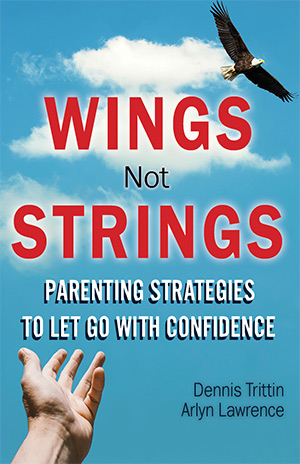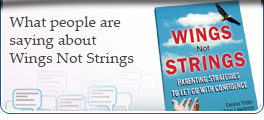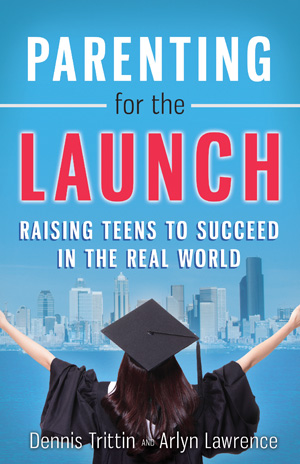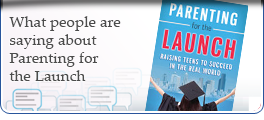Will We Ever Let Them Go: Part One
9/26/2016 6:41:17 PM
Like most of you, I hate stereotypes and generalizations. They’re unfair and usually do more harm than good. It’s why I’m not a fan of “bucketizing” people into this/that gender/age/ethnicity/economic/religious/political category. To me, the main “fruit” of these efforts is disunity.
But, at the risk of not taking my own advice, I’d like to weigh in on the conversation about a group that is perhaps more stereotyped than any these days. . . Millennials. Having raised two of our own and as an author/publisher/mentor/educator devoted to training up our next generation, I feel a special bond toward them. But, judging by what I read and hear, it’s as though their foreheads are etched with a “scarlet M.”
You’ve likely heard their negative labels: entitled, lazy, fragile, impatient, narcissistic, distractible, relationally challenged, needful, and the like. Hopefully, you’ve also heard the positive: passionate, creative, connected, entrepreneurial, idealistic, and globally minded. (As a product of the Sixties and Seventies, it makes me wonder what was said about us!)
But, here’s the deal: IF some of the negative stereotypes of Millennials have some merit, I don’t believe it’s only (or even primarily) because of them. Much of that responsibility lies with us—the generation that has parented and trained them. By all accounts, we are not equipping them as fully as we should—not parents, not schools, and in some cases, not employers. We’re also struggling to let go. Big time!
Too often, instead of releasing eagles to soar with confidence, we’re releasing young adults that we continue to control, coddle, or inadequately equip. Generally speaking, we’re not providing the practical, relevant, holistic training they need to succeed in adult life, and it’s showing. I believe this is attributable to several factors: 1) parents and educators assuming the other is covering the training (e.g., finance, soft skills) so it falls through the cracks, 2) consequences of the breakdown of the American family, and 3) educators focusing more on training the mind than the whole person for adulthood. It’s no wonder that the stage of adolescence continues to grow. And grow.
That’s on us. And, we need to do better. For them.
So, for the rest of this blog series, I’ll be offering my recommendations—to parents, secondary school educators, colleges, and employers—to help set our younger generation up for real world success. Due to space limitations, it’s an incomplete view, so I’ll focus on my best ideas.
In this first post, I’ll address my thoughts to parents. After that, I’ll concentrate on secondary school and college educators, and finally, employers. We all have a stake in this game. I’m sure you can add to my ideas, and you might even disagree with some of my views. I welcome your contributions. That’s what makes it a conversation!
To Parents:
We all want our children to be happy and successful, but sometimes we get in their own way. In fact, discussions with those receiving our high school graduates (e.g., universities and employers) reveal the downside of helicoptering, performance parenting, excessive coddling, and absentee parenting: students struggling with self confidence and coping with the demands of adulthood. Consequently, parents are calling professors to complain about grades. Parents are calling employers to complain about their “kids” being overworked and underpaid. Parents are even coming to job interviews! Many parents are so invested in their children’s success that they won’t let go. Is it any wonder so many young adults are having difficulty growing up?
With that, here are some suggestions for raising our parenting bar and releasing a new generation of well-prepared and confident leaders:
- Adopt an empowering parenting vision and mindset: what if we replaced “raising children” with “raising future adults?” This mindshift can make a world of difference. In our book on this topic, Parenting for the Launch, we call it, “giving them wings, not strings” and “moving from driver seat to passenger seat.”
- Emphasize character and “soft skills” over performance. Success in career and life requires a solid leadership foundation made up of qualities like integrity, reliability, high standards, kindness, respect, other-centeredness, work ethic, humility, positivity, and manners. It also requires attributes like self control, resilience, interpersonal skill, decision-making, time management, and communication. These are sustainable leadership qualities. Where are we placing our emphasis?
- Invest in your relationship. It takes both quality and quantity time to build a relationship that endures. “I didn’t spend enough time with my children” is an all-too-common regret you never want to experience! Stay fully engaged.
- Surround them with positive influences and adult role models and mentors. Use every opportunity to introduce them to great people! These invaluable third party voices offer friendship, wisdom, and connections to help grow their network. It also builds communication skills and respect for adults.
- Help them build self awareness. In the teen and young adult years, it’s critical to understand one’s assets, nature, and passions. Parents can contribute valuable insights that instill vision, belief, hope, and a sense of value.
- Encourage them to stretch themselves and take risks, even if they may not succeed. Help them embrace new experiences and challenges. Regardless of the outcome, winning is in the journey. Build a “Go for it!” attitude..
- Limit their use of technology and impose tech-free zones during family times. Be highly attentive to the addictive tendencies of technology, especially if it starts to affect their relationships, communication, and productivity. And, don’t let devices and TV serve as a “babysitter.”
- Be strategic about preventing some of the common stereotypes. That means promoting a strong work ethic (chores help!), instilling other centeredness (volunteering for the less fortunate), learning to accept constructive feedback, being able to build authentic relationships, developing their ability to problem solve and handle disappointments and conflict, and teaching them how to communicate professionally with adults.
- Resist the temptation to solve their problems and manage their performance. These are self confidence destroyers that hamper decision-making and can create co-dependence.
If you are the parent of a millennial—what steps have you taken to help make them more “real world ready?” Are there any tips or pointers you would add to this list?
Later this week, I will be addressing my recommendations to secondary educators (with two more parts in the series coming next week!). I’m excited to share this blog series with you and hope you’ll continue to read on and engage as we discuss our roles in equipping the next generation for success!
If you’re interested in accessing the entire article (how we as parents, high school teachers, college professors, and employers can help equip millennials for success) in one place, you can find it in our resource center here.
Tagged as: millennials, success, what i wish i knew at 18, parenting for the launch, parenting, teens, educators, college, academics, career, real world, life perspective



















